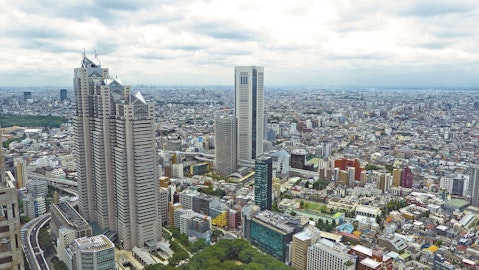In this article, we are going to list the 15 countries with the highest corporate tax rates. Click to skip ahead and jump to the 5 countries with the highest corporate tax rates.
More or less every nation in the world taxes both its citizens and the corporations that operate in the country. Tax has always been a really controversial topic in most countries, dividing people as there are few people who can actually reach a consensus regarding tax. Many people, and most corporations, hate paying taxes because it of course lowers the money that they actually get to take home, and they feel that just giving it to the government is not justified. Now, there may be some logic to this in many developing countries, where government corruption is rampant. After all, in these countries, the taxes that people pay don’t really provide them with many tangible returns; instead, taxes are used to pad the wallets of the corrupt. Further, in such countries, laws and regulations regarding tax and its collection are often lax, while even when they’re not lax, their implementation and enforcement is subject to significant improvement, which is why many companies and people get away without paying tax.
On the other hand, developed countries are notorious for the high rates of taxes that they charge, both on individuals and on corporations operating within the countries. In Western Europe, tax can often be around 50% of your income which means that whatever you earn, 50% of the amount goes in the coffers of the government. However, despite this setback, many people in these countries, in fact the vast majority, is in support of high taxes and even advocate higher taxes. This is because these developed economies enjoy a really high standard of living, and the tax that they pay is put to good use, allowing for greater development in infrastructure including roads and bridges, while also ensuring state of the art public transport which isn’t costly and is extremely punctual, which means people can depend on them completely. And, since people know that these governments are transparent and not corrupt, they know that their money is being put to good use. This is why in many developed countries, you see added benefits such as social healthcare, which alone can save you significant costs, and is something even the most powerful country in the United States is unable to boast about.

lOvE lOvE/Shutterstock.com
Most corporations hate paying taxes, and try to work out ways to avoid paying taxes. See, the thing is, tax is an incredible complex subject which is why these companies are happy paying big bucks to tax professionals to try to work around the various provisions of law so they can save a lot more money than they are paying out. One such way is the carry forward of losses. In most countries, if you make losses rather than a profit, you are allowed to carry forward those losses and set them off against future profits, which basically means even if you make profits the next year, you still might not end up paying taxes. This is something used by many major companies, such as Amazon (NASDAQ:AMZN), which was a loss making company up to a few years ago, when it finally started turning a profit, mainly thanks to its Amazon Web Services division, which is currently competing with Google (NASDAQ:GOOG) and Microsoft (MSFT). However, despite making profits worth billions of dollars, Amazon did not pay a cent in federal tax because it continues setting off its losses from previous years, and so all of its profits go into the pockets of the owners of the company. Most of these companies also operate in the regions where there are high corporate taxes such as India, since there is huge demand there and a lot of money to be made for these companies.
As I mentioned earlier, tax is a controversial topic and corporate tax is dividing opinion more than ever before, with many people calling on deductions in the tax paid by corporations. This lobbying by companies has resulted in corporate taxes consistently decreasing ever since the 1980s on a global level, while tax avoidance and tax evasion is increasing simultaneously. Before me move on, let me explain the difference between the two terms. Tax avoidance is avoiding paying tax by using the law and legal loopholes and find out ways to avoid paying tax, which is what tax professionals are hired for by corporations. This is completely legal. On the other hand, tax evasion is using illegal methods to avoid paying taxes and can result in fines, penalties and even jail time if companies are found to be guilty of engaging in tax evasion.
Taxing corporations allows for a better distribution of income and helps in bridging the gap between the rich and the poor. Corporate tax revenue make up more than a tenth of all tax revenues in developing countries, and the share varies from country to country. If corporations aren’t taxed or are taxed at very low rates, this will allow wealthy individuals to simply create shell companies and store their income their, which will allow them to avoid tax on their personal income as well, while a salaried individual will not have these options, and hence will be paying more tax while actually not making as much money. In the United States, 90% of corporate stocks are owned by individuals who are in the top 10% in terms of wealth in the country. Since corporation profits flow to shareholders in the form of share price and dividends, taxing companies means taxing the richest individuals which is needed to reduce inequalities and distribute wealth more evenly.
So, if taxing corporations is so beneficial for countries, why are governments consistently reducing tax rates for corporations? Well, the answer is simple. Since each country has its own laws and regulations and there isn’t a united, concentrated effort, companies simply up and move their headquarters or operations from countries with high tax rates to countries with low tax rates. Since countries don’t want to lose the revenue and economic stability that such major corporations bring, they are ready to compromise and reduce taxes or provide tax incentives. You may remember that when Amazon, one of the biggest companies in the world, was looking for a second city to establish global headquarters in, cities made bids to the company, often providing tax cuts and tax incentives to convince the company to establish its headquarters there. You can also see this at a smaller level in the US, where corporations move from one state with higher taxes to another state with lower taxes. One of the most recent and biggest examples is Tesla (NASDAQ:TSLA), which snubbed Silicon Valley and instead moved its headquarters to Texas, which has lower tax rates and lower cost of living as compared to California. Other companies, such as Hewlett-Packard (NYSE:HPQ) also made the same move while Palantir (NYSE:PLTR) moved from California to Colorado.
Some countries are referred to as tax havens. A tax haven is generally an offshore country which has little to no tax rates, and do not really co-operate with foreign authorities, allowing companies operating in such tax havens complete privacy. These countries encourage companies to be registered in such countries which bring about economic improvements in the country, while allowing the company to stores its money outside of countries with higher tax rates, and hence, avoid paying taxes on this money. Some of the most famous tax havens in the world include Cayman Islands, the Bahamas, Belize, Bermuda and the Isle of Man among others.
On the other hand, there are countries who charge quite high tax rates. The funny thing is, the country with the highest corporate tax rate doesn’t impose any income tax on individuals. The other countries in our list often used to have really high tax rates but have reduced them over the years. Even after the reduction, they are still among the 15 countries with the highest corporate tax rates. Our list is based on the average tax rates imposed by countries over the past decade, with all of the data being taken from KPGM. So without further ado, let’s see the countries where corporations have to play their part in improving the economy, starting with number 15:
15. Cameroon
Average tax rate over the past decade (2011-2020): 33%
We kick off our list with the only African country here in Cameroon.

Pixabay/Public Domain
14. Monaco
Average tax rate over the past decade (2011-2020): 33.08%
Even though it does not have a general corporate tax rate, Monaco still engages taxes on certain businesses, and the average tax rate is over 33%, according to KMPG.

13. St Maarten
Average tax rate over the past decade (2011-2020): 33.08%
While private foundations and trusts are completely exempt from tax in the country if they’re not conducting any enterprise, the overall tax rate is one of the highest in the world.

12. India
Average tax rate over the past decade (2011-2020): 33.17%
India’s tax rate was up to 35% in 2018, before falling to 30% in 2019 and 2020, which is why it has fallen down the rankings.

SNEHIT / Shutterstock.com
11. Argentina
Average tax rate over the past decade (2011-2020): 33.5%
South America has multiple entries in the countries with the highest corporate tax rates and Argentina kicks off the list.

Celso Diniz/Shutterstock.com
9. Venezuela
Average tax rate over the past decade (2011-2020): 34%
While Venezuela’s economy has been decimated in recent years and hyper inflation has further affected the country, it still maintains a really high corporate tax rate at 34%.

9. Brazil
Average tax rate over the past decade (2011-2020): 34%
Brazil’s average tax rate for corporations has consistently hovered at the 34% mark over the past decade. The all time high was 37%, reached in 2000.

Thiago Leite/Shutterstock.com
8. Japan
Average tax rate over the past decade (2011-2020): 34.003%
Japan used to have the second highest corporate tax rate in the world at more than 40%. However, the rate has not fallen to 30.62% as we have witnessed a gradual decline in the rate over the past decade.

Pixabay/Public domain
4. Zambia
Average tax rate over the past decade (2011-2020): 35%
In Zambia, different industries have different tax rates with technology companies facing the highest tax rates at 40% while the agriculture sector is taxed only at 15%.

4. Sudan
Average tax rate over the past decade (2011-2020): 35%
In 2010, the corporate tax rate in Sudan was just 15%, though this was increased to 35% in 2011, and has remained at the same level ever since, making it one of the countries with the highest corporate tax rates.
Please continue to see the 5 countries with the highest corporate tax rates.
Suggested articles:
- 15 biggest companies that don’t pay taxes
- 25 countries that have the most debt per capita
- 15 countries with the highest standards of living in 2020
Disclosure: No position. 15 countries with the highest corporate tax rates is originally published at Insider Monkey.





